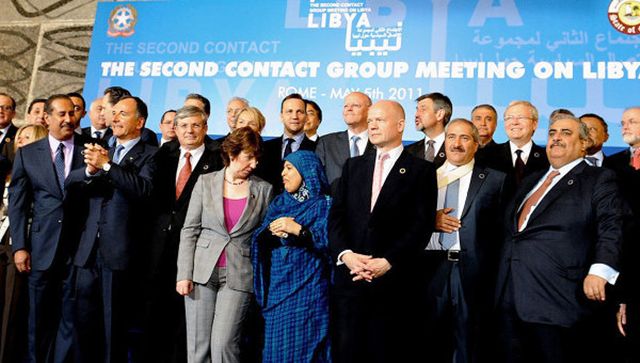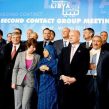
NATO Clarifies Goals in Libya
Publication: Eurasia Daily Monitor Volume: 8 Issue: 88
By:

NATO allies seek additional military, political, and financial means to overcome the unanticipated stalemate in Libya. Alliance leaders are also addressing incipient symptoms of fatigue with the seemingly protracted operation, conducted by an ad-hoc group of countries on NATO’s collective behalf. At the same time, Russia seeks to enlist Chinese help in frustrating NATO and US goals in Libya and the wider region.
In his monthly press conference on May 4, NATO Secretary-General Anders Fogh Rasmussen clarified the Libya operation’s short-term military goals as follows: 1) cessation of all attacks and threats against the civilian population by Colonel Gaddafi’s forces; 2) verifiable withdrawal of all those forces to their bases; and 3) guarantees of unhindered access for humanitarian supplies. Rasmussen stated that air strikes had substantially reduced Gaddafi forces’ combat hardware, communications, and ability to sustain forces in the field. However, he sidestepped questions about a possible time-frame for the operation. He "does not sense any fatigue," and the operation will last "as long as necessary" to attain those three military goals. Those three items, however, are being presented as short-term goals, indeed as demands for immediate compliance by Tripoli (www.nato.int, May 5).
NATO has been in command of Operation Unified Protector in Libya since March 31. The member countries’ Foreign Affairs ministers had first outlined those military objectives at their April 14 meeting in Berlin. In his May 4 press conference, Rasmussen added some political goals in a very broad outline: Gaddafi’s departure from power, a "political solution that would respond to the Libyan people’s aspirations," and "pressuring the regime to allow a peaceful transition to democracy."
Meanwhile, NATO military and civilian officials speak of "steady progress" through air strikes, "slowly but surely advancing toward our goals;" and are calling for resolve and patience. The governments of the largest countries involved – Britain, France and Italy – have ruled out a military operation on the ground. Each of the three countries has admitted to sending 10 military advisers to the Benghazi rebels in late April. The United States has also ruled out a ground operation, and has drastically curtailed its own involvement in the air campaign since March 31. The US has authorized up to $25 million in non-lethal types of military assistance to the Benghazi authorities.
French Minister of Foreign Affairs Alain Juppe – a traditional Gaullist, disinclined toward humanitarian interventions – publicly expressed hope that the Libya operation would "last no longer than a few weeks, a few months at the most" (France 24 TV, Agence France Presse, May 4). Also on May 4, the Italian parliament narrowly voted (308 to 294) to authorize Italy’s continuing participation in the campaign; but asked the government to seek an end to air strikes and a political solution within a definite time frame. The government’s partner, Northern League, opposes the intervention and threatens to bring down the government over this issue (Defense News, May 4).
On May 5 in Rome, the Libya Contact Group decided to increase political, psychological, and economic pressures on the Tripoli government, supplementing NATO’s military efforts. The Libya Contact Group comprises more than 20 countries (including many NATO members) and six international organizations (including NATO and the EU alongside the US, UN, Arab League and others). Thus, NATO members’ views are amply represented in the Contact Group; and the result of its May 5 meeting could destabilize the Tripoli government to the extent of precipitating a successful end to NATO’s military campaign.
The Contact Group has called for immediate departure or removal of Colonel Gaddafi and his circle from power ("they have lost all legitimacy"), threatened them and potentially their associates with international prosecution for crimes against humanity, and appealed to those same Tripoli circles to disassociate themselves from Gaddafi. The Contact Group calls for blocking the Tripoli government’s oil exports. At the same time, the Group has approved the creation of a "temporary financial mechanism" to subsidize the Benghazi authorities’ civilian functions in Libya’s east, using funds from the Tripoli government’s frozen accounts abroad. Benghazi authorities claim that they need $2 billion to $3 billion in order to function over the next two to three months.
On issues relating directly to NATO, the Contact Group encourages additional military contributions to the Alliance’s Operation Unified Protector, underscoring that it enjoys UN legitimacy (an argument increasingly disputed by Russia outside the Contact Group). Rasmussen was able to conclude on a reassuring note (www.nato.int, May 5): "We all share the desire to see this (campaign) end, sooner rather than later. A sustained coordinated international effort, comprising both political and military means, will help bring an end to this crisis."




